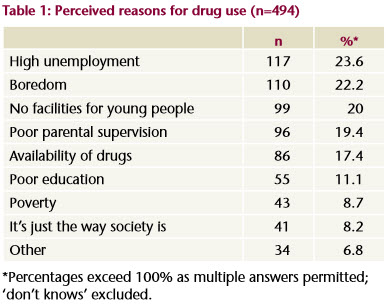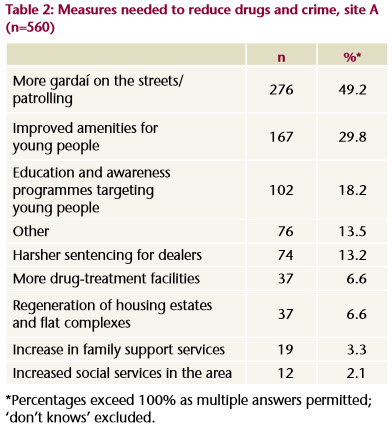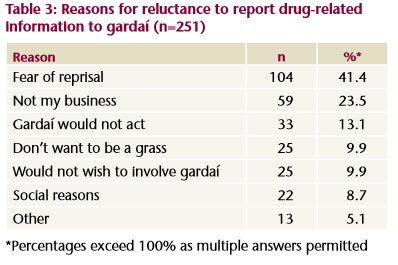Connolly, Johnny (2015) Local residents’ views on illicit drug markets. Drugnet Ireland, Issue 52, Winter 2014, pp. 6-7.
| Preview | Title | Contact |
|---|---|---|
|
PDF (Drugnet Ireland 52)
1MB |
As part of the illicit drug markets study described in the previous article, a street survey of approximately 800 local residents and business people was carried out to gather information about the local community in relation to illicit drug use. The survey incorporated almost 60 questions related to local drug markets. Below we look at just three of the key responses – reasons for drug use, future responses needed and fear of drug dealers.
Perceived reasons for drug use
Residents were surveyed on the perceived reasons for drug use in the area. Of those who responded to the question, one quarter highlighted issues impacting on young people: unemployment, boredom, the absence of facilities and poor parenting. Seventeen per cent highlighted the availability of drugs.

Future responses needed
With regards to the measures needed to reduce drugs and crime, almost 50% highlighted the need for improved amenities for young people along with education and awareness programmes targeted at young people. However, a clear majority across all four study locations called for an increase in the number of gardaí visible on the streets, patrolling. Despite other findings of the study to the effect that the gardaí could only have limited sustained impact on local drug markets, clearly the importance of a police presence is regarded as crucial. On the one hand this reflects the reassurance that a police presence can bring to local residents; on the other hand it reflects the idea that such a continuous presence can help ensure open drug markets do not become entrenched in an area. Police patrolling can ensure that drug markets are continuously disrupted.

Fear of drug dealers
The need for a local police presence is also highlighted in Table3 below. The research found that one of the major consequences of drug-related violence and intimidation is that it can act as a major disincentive to taking action and/or engaging with state agencies in responding to such problems. When asked whether they would report drug-related information to the gardaí and, if not, why not, most respondents (41.4%) highlighted their fear of reprisal from those involved in the drug trade. In National Crime Victimisation Surveys, such as those conducted by the Central Statistics Office, fear of reprisal is never reported as a significant reason for people not reporting crimes to the Garda Síochána.1 Twenty-three per cent believed that the gardaí would not act or stated that they did not wish to involve gardaí; a further 23%responded that it was not their business; and almost 10% stated that they did not want to be seen as a ‘grass’, or informer.

The fear and intimidation that can be generated locally as a consequence of illicit drug dealing reveal the insidious and disproportionate impact that crime can have on specific locations where drug markets develop. It also represents a significant policy obstacle in terms of obtaining community consent or participation in community-based and partnership responses to crime. A number of interview respondents commented on this very real issue. The following imprisoned drug dealer felt that, although violence has always been associated with the illicit trade in drugs, the debt-related intimidation of family members of those who owed money to drug-dealers was relatively recent.
Violence, it was, it was always in it. It was part and parcel of like you get stigmatised, you know, drugs – with drugs comes violence and it is true. With drugs comes violence but I was never violent. I was always sympathetic to those who went off them, always. I would never go around as they do now fucking like tapping on doors, looking for the aul’ fella, looking for the fathers or mothers to pay but I was never like that. I would write it off – more times out of 10 like if I got out of pocket from doing it, but I would never use violence. Prison Interview
-
Central Statistics Office (2009) Quarterly National Household Survey: Unemployment. Available at: www.cso.ie See also Connolly J (2003) Drugs, crime and community in Dublin: monitoring quality of life in the north inner city. Dublin: North Inner City Drugs Task Force
MA-ML Social science, culture and community > Sociocultural aspects of substance use > Societal attitude toward substance use / public opinion
MA-ML Social science, culture and community > Social condition > Poverty / deprivation
MM-MO Crime and law > Substance related offence > Drug offence > Illegal distribution of drugs (drug market / dealing)
MM-MO Crime and law > Crime and violence > Crime against persons (assault / abuse)
MM-MO Crime and law > Crime and violence > Crime against persons (assault / abuse) > Intimidation
MM-MO Crime and law > Justice system > Community anti-crime or assistance programme > Community policing / police
VA Geographic area > Europe > Ireland
Repository Staff Only: item control page